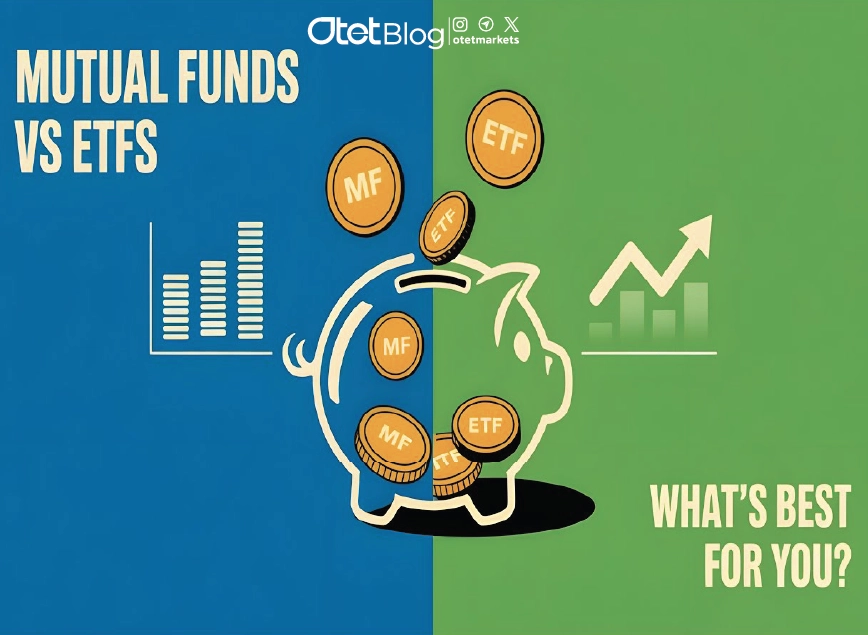
Mutual Funds vs. ETFs: A Clear Guide for Smart Investors
Estimated reading time: 3 minutes
Table of contents
For modern investors seeking smart diversification, Mutual Funds and Exchange-Traded Funds (ETFs) stand out as two of the most trusted tools. When comparing funds vs. ETFs, while both offer access to a basket of assets and simplified portfolio building, they differ significantly in terms of structure, fees, trading behavior, and tax efficiency.
Understanding these differences is key to choosing the right fit for your financial goals. Here’s a detailed, side-by-side analysis of both options.
What Is a Mutual Fund?
A Mutual Fund is an investment vehicle that pools money from multiple investors to buy a diversified portfolio of assets—stocks, bonds, or a mix of both.
Key Characteristics:
- Actively or passively managed depending on the fund’s objective
- Trades once daily at the Net Asset Value (NAV), not throughout the day
- Involves management fees and operational costs
- Often has a minimum investment requirement, typically ranging from $500 to several thousand dollars
What Is an ETF (Exchange-Traded Fund)?
An ETF is similar to a mutual fund in terms of holding a diversified group of assets, but it trades like a stock on an exchange, allowing investors to buy and sell throughout the day.
Key Characteristics:
- Typically passively managed and designed to track an index
- Trades in real time, just like individual stocks
- Usually offers lower fees than mutual funds
- Known for being more tax-efficient due to a unique structure that minimizes taxable events
ETFs vs. Mutual Funds: Side-by-Side Comparison
| Feature | ETF | Mutual Fund |
|---|---|---|
| Trading Method | Real-time, all day | Once daily at market close |
| Fees | Typically lower | Typically higher |
| Minimum Investment | Often just the price of one share | Often $500–$3,000+ |
| Tax Efficiency | High | Lower |
| Liquidity | Very high | More limited |
| Management Style | Generally passive | Active or passive |
Pros and Cons of Each Investment Tool
✅ Advantages of ETFs:
- Low-cost structure with minimal management fees
- Real-time trading and price transparency
- No significant minimum investment barriers
- Ideal for DIY investors familiar with trading platforms
⚠️ Disadvantages of ETFs:
- Brokerage fees may apply for each transaction
- Prices can deviate from NAV during volatile markets
Read More: Seven Essential ETF Trading Strategies for Beginners
✅ Advantages of Mutual Funds:
- Professional management with in-depth research and active strategies
- Excellent for retirement accounts and long-term financial planning
- Wide range of thematic and sector-specific strategies
⚠️ Disadvantages of Mutual Funds:
- Higher management fees due to active oversight
- No intraday trading, limiting flexibility
- May suffer from lack of transparency and underperformance in certain markets
When Should You Choose an ETF?
Consider choosing an ETF if:
- You value low costs and liquidity
- You want to track an index like the S&P 500 or NASDAQ
- You’re comfortable using brokerage platforms and monitoring prices
Read More: Bitcoin ETF Options Trading Begins: A New Era for Crypto Investment
When Is a Mutual Fund a Better Fit?
Opt for a Mutual Fund if:
- You prefer professional, hands-on management
- You’re investing for the long term, especially through retirement accounts
- You’re looking for a passive approach and don’t want to monitor daily markets
Key Considerations Before Choosing
Before deciding between an ETF and a mutual fund, consider the following factors:
- Your Investment Goals: Growth, income, or capital preservation
- Risk Tolerance: Conservative, moderate, or aggressive
- Time Horizon: Short-term vs. long-term investing
- Cost Sensitivity: Management fees and trading costs
- Tax Implications: Especially if investing in taxable accounts
- Fund Manager Track Record: For actively managed mutual funds
Conclusion
Both ETFs and mutual funds are effective tools for building a diversified, goal-driven portfolio. The right choice depends on your investment style, desired level of control, and financial objectives. For hands-on, cost-conscious investors, ETFs may be the perfect match. For those who prefer a guided, long-term approach, mutual funds still offer strong appeal.
The best portfolio may even include both—balanced to match your unique journey.
Share
Hot topics

Trading with price action
When they start, most traders will believe that they must discover the ideal indicator for success. At otet markets, we see this every day.They test a variety of indicators, including...
Read more




Submit comment
Your email address will not be published. Required fields are marked *